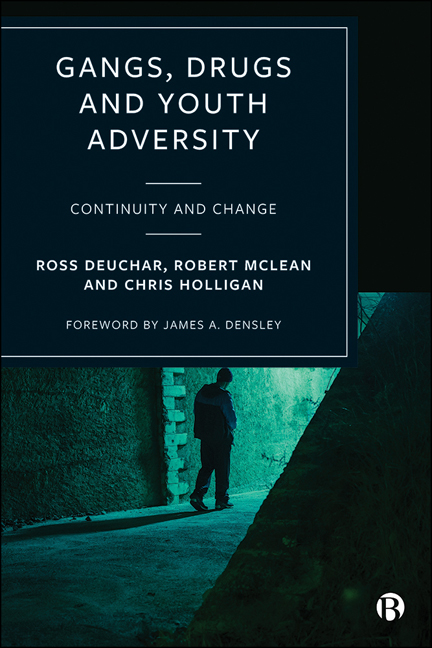Book contents
Foreword
Published online by Cambridge University Press: 13 May 2022
Summary
I first met Ross Deuchar in 2015 at an international conference on youth outreach organised by the City University of Hong Kong. Ross and I were invited plenary speakers and spent our days and nights being ushered between presentations, meetings, dinners – and even a midnight outing on the streets to interview local gang members and observe social service providers in action. We had stunning vistas and gracious hosts, good food and great conversation, but with the jet lag (there is a 14-hour time difference between Minneapolis and Hong Kong), much of that week remains a blur.
One moment of clarity from my trip overseas was Ross’ plenary speech. In a talk titled ‘Scottish Youth Gangs, Territoriality and Street Violence’, Ross shared insights from a decade of working with young offenders. Two things stood out from that talk. First, Ross wasn't one of those esoteric armchair theorists who claim to have all the answers about gang members despite never having asked them any questions. No, Ross was a true pracademic – he’d paid his dues as a schoolteacher and was using that real-world knowledge and experience to inform his scholarship, which was data-driven and practice-and policy-focused. Second, Ross really cared about the lives of the people he researched. They weren't just his ‘participants’ and ‘subjects’; they were human beings with stories to tell.
The talk was built on Ross’ 2009 book Gangs, Marginalised Youth and Social Capital and its 2011 sequel, Policing Youth Violence: Transatlantic Connections. I’d read both books, as most criminologists had, but it was only after hearing Ross speak and spending time with him that week that I truly came to appreciate them. There we were, 6,000 miles from home, and voices from the streets of Glasgow and West Scotland were resonating. I finally understood what made that great ‘city of gangs’ different from other places (Davies, 2013), but also the same – how poverty, sectarianism and violence had shaped the city's past and present.
Well, here we are now in the future. And with Gangs, Drugs and Youth Adversity: Continuity and Change, Deuchar returns to the people and places he went to before to discover what, if anything, has changed in the last decade.
- Type
- Chapter
- Information
- Gangs, Drugs and Youth AdversityContinuity and Change, pp. v - viiiPublisher: Bristol University PressPrint publication year: 2021



